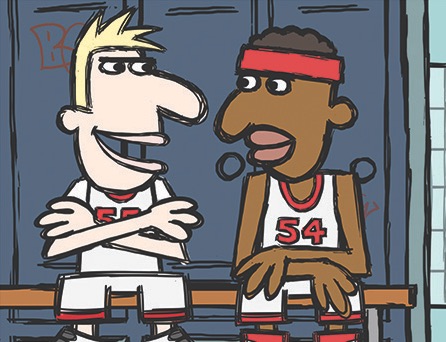Networks Double Down on Promising Rookie Series

The smarter way to stay on top of broadcasting and cable industry. Sign up below
You are now subscribed
Your newsletter sign-up was successful
Related: Triumph Tackles Conventions for Hulu
Six weeks before their series premiere, creators of Legends of Chamberlain Heights had another reason to be excited: Comedy Central picked up a second season. Whereas a program once had to prove it could draw viewers before earning a renewal, the ultra-competitive programming landscape means network chiefs are more willing to bet on two seasons of a promising series—before the premiere even airs.
Chamberlain Heights, which Comedy Central president Kent Alterman said “pushes the envelope far enough to warrant a second season,” is the latest in a string of pre-premiere renewals that includes truTV’s Those Who Can’t, Starz’s Ash vs. Evil Dead, Cinemax’s Outcast and OWN’s Queen Sugar.
In today’s binge culture, where a viewer may think nothing of catching up on an entire season in a weekend, a two-season order is increasingly common. “People often won’t engage with season one unless they know season two is coming,” says Brett Weitz, executive VP of original programming at TBS, which ordered a sophomore season of The Detour before its premiere. “Consumers are very savvy these days. If you believe in the content, you want to show the consumer it’s something you believe in.”
Fully Committed
In this seller’s market for content creators, savvy dealmakers are increasingly pushing for the two-season deal up front, say some network execs. And the networks, eager to establish their brand in the 400-scripted originals universe, can be equally keen to lock in a key show, and talent, for the longer term.
Perhaps no network has been more active with pre-premiere renewals than Starz, which has given early green lights to Black Sails, Blunt Talk and Spartacus over the years. “With this competitive landscape for shows, sometimes you have to offer more than the other networks,” says Carmi Zlotnick, managing director at Starz.
The smarter way to stay on top of broadcasting and cable industry. Sign up below
For truTV, the comedy Those Who Can’t represented its first venture into scripted series. When network principals were pleased with how the creative was coming together, they sprung for a second season two months before premiere. That enables Those Who Can’t, which premiered in February, to return in October. “People want to keep a good thing going,” says Chris Linn, president. “When the team has gotten into a good rhythm, you want to minimize the downtime.”
Linn also notes how a larger group of episodes is better monetized with back-end, and international, buyers.
The trend is, to a degree, a response to broadcast’s history of killing poorly rated series well before the first season concludes. While it’s primarily cable channels that are giving the quick renewals, it was notable that Netflix ordered 20 episodes of new Chuck Lorre comedy Disjointed last month.
Of course, doubling down on a show effectively doubles the network’s risk. HBO, for one, renewed Vinyl less than a week after its premiere, only to later cancel the order on the underperforming show—a significant ding on the HBO brand.
But connecting with today’s distracted viewer takes extraordinary commitment. “It used to be, you’d know after one or two episodes if a show is a hit,” Linn says. “Now, you’ve got to have two seasons before you get a sense of whether the audience is connecting with it.”
Michael Malone is content director at B+C and Multichannel News. He joined B+C in 2005 and has covered network programming, including entertainment, news and sports on broadcast, cable and streaming; and local broadcast television, including writing the "Local News Close-Up" market profiles. He also hosted the podcasts "Busted Pilot" and "Series Business." His journalism has also appeared in The New York Times, The L.A. Times, The Boston Globe and New York magazine.

